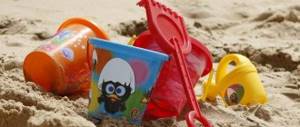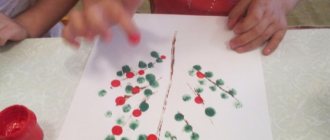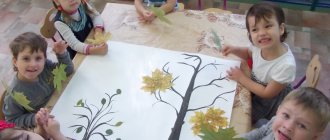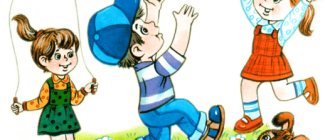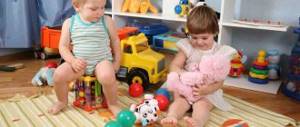Stages of speech development in children
Parents look forward to the moment when their baby starts talking, because this event is a significant leap in the child’s development. However, active speech training begins long before you hear the child’s first word spoken. For each stage of speech formation, there are special developmental methods that adults can use with children.
Infancy
Newborn babies may scream and make simple vowel sounds such as “oooh” or “aah.” As they listen to you talk, they try to respond with their own sounds. Read aloud to them so they can hear the rhythm of the speech. At the age of 6-7 months, children can already babble simple syllables, such as “ba-ba” or “da-da.” Repeat the child’s sounds to encourage him to continue the “conversation” with your example.
At the age of 8 months, receptive language, that is, a set of words that the child understands, develops, so it is important to pronounce to him the names of surrounding objects. Speech-language-hearing specialists recommend playing simple imitation and finger games, such as Peek-a-boo or Peek-a-boo.
1 year
At the age of 1 year, a child can already pronounce 1-2 words in addition to “mom” and “dad”. According to the National Institute on Deafness and Other Speech-Language Disorders, a child develops his own “jargon,” a type of nonsensical speech that varies grammatically like adult language. Talk to your child about what he does during the day, because his vocabulary directly depends on how often his parents talk to him.
Young children begin to use gestures, such as pointing, to communicate. Encourage your child to say words and sounds along with gestures, encouraging attempts to speak. Even if you don't understand the children's words, try to guess logically or ask a question. This stimulates the child's attempts to talk.
From 1.5 to 2 years
By the age of 1.5 years, children can already pronounce many individual words and even try to put them into short phrases. When your child points to an object and says a word, you can develop what he said into a sentence. For example, if a child says “dog,” you can answer: “Yes, the dog is brown,” or to the word “milk” ask: “Do you want milk?”
Continue reading books to your child, describing the pictures and asking questions about them. Children are able to find and point out objects in a book, even if they cannot speak a word.
2 years
From the age of 2 years, children can speak short sentences. As sentences become more complex, children try to experiment with the rules of grammar by hearing speech around them. For example, a child may say “ran” instead of “ran” or “people” instead of “people”. Don't correct him. Just repeat the sentence with the correct words, as experts on speech development in children advise.
Preschool age
By the end of preschool age, a child should know about 2000 words, have a clear and accurate sound pronunciation, be able to correctly express his thoughts, retell short texts, and compose stories based on plot pictures.
In preschool age, learn nursery rhymes and sing songs with your child, as constant repetition of rhythmic texts helps the child develop memory. In addition, often the child himself finds the stories he likes and happily listens to them again. Then let him tell you what he read. Effective and interesting tasks for speech development for preschoolers are widely presented later in the article.
MAGAZINE Preschooler.RF
Using voice-speech training to develop and improve the speech of preschool childrenSpeech therapist of the highest category Katkova Angela Nikolaevna. MBDOU DS No. 436, Chelyabinsk
This article will be useful to speech therapists and teachers of speech therapy groups. For children of senior preschool age. The training can be used to automate the delivered sounds.
In recent years, there has been an increase in the number of children with speech disorders. And clear and correct speech is the key to productive communication, confidence, and success.
Theatrical activities, the use of elements of acting, and logorhythmics are a type of children's creativity. This activity is close and understandable to the child, lies deeply in his nature and finds its detachment spontaneously, because it is connected with play. The child wants to put all his inventions and impressions from the life around him into living images and actions. Entering the character, he plays any role, trying to imitate what he sees, receiving great emotional pleasure.
The idea arose of creating pedagogical activities to develop children’s speech through speech training. Teaching stage speech is inextricably linked with the formation of plastic freedom, the development of elasticity and mobility of the respiratory and vocal apparatus, the improvement of speech hearing, and voice production.
Speech training is a special type of work with children, the distinctive feature of which is that children mainly manipulate already formed concepts and skills acquired earlier.
The main qualities that are trained in voice-speech training exercises:
- phonation breathing (various types of exhalation dictated by the nature of speech)
- the skill of “switching” breathing, ensuring high-quality speech sound during slow-fast, loud-quiet, calm-expressive speech.
- support of sound, soft attack of sound.
- concentration and sonority of the voice, finding your “center” of the voice.
- strengthening the strength of the voice, improving the natural timbre.
- diction clarity, vocal flexibility.
Correct speech breathing is the basis of sounding speech. It ensures normal voice and sound formation, preserves the smoothness and musicality of speech, and creates the opportunity, depending on the content of the utterance, to change the strength and pitch of the voice.
Voice and speech training with elements of acting for preschool children.
Goals:
- develop voice data (diction, timbre, articulation, speech message) through exercises to develop diction and articulation, work with tongue twisters
- develop the ability to portray emotions using voice, facial expressions, gestures
- develop intonation expressiveness
- develop the creative potential of each child, the ability to improvise
- develop creative imagination and fantasy
Equipment:
- musical equipment, phonograms
- emotion pictograms
Artistic warm-up “Hello”
Let's say: “Hello” with the following intonation:
- with joy
- with surprise
- as president of the country
- like a sly fox
- like a bad wolf
- like a tired grandma
- like a good mother when she wakes up her child
| Next > |
Developing a child’s speech: simple rules
So, as already mentioned, situations where by the age of 3 a child practically does not utter words or speaks in such a way that it is difficult to understand him are observed quite often. How many parents can boast that their children do not suffer from delayed or impaired speech development? When a problem is urgent, the search begins for ways to solve it. On the one hand, an experienced speech therapist advises waiting until 5 years old, but on the other hand, the child risks going to first grade with speech defects, since there may not be enough time to eliminate them.
What to do? As early as possible, organize independent classes and regularly perform exercises to develop the child’s speech, using a special thematic course as a basis.
The task is to form speech thinking by practicing articulation, expanding active vocabulary and developing competent, coherent speech.
At first glance, it seems that a lot of time should be devoted to speech classes. For this reason, parents hesitate to start them for a long time. In fact, everything is not so difficult: speech development exercises can be done at almost any time in everyday life and without financial costs. How to develop a child's speech? Follow simple rules.
- The foundation of speech development is constant communication with children. They ask a lot of questions, the answers to which should not be avoided. If it’s difficult to answer right away, it’s better to say so. Let the child wait until the adults think, but later he will receive the necessary information, become interested in the interlocutor and will strive to communicate with him.
- Children imitate the conversation of adults, so you should not imitate a “childish” way of speaking by distorting a word or sound and using diminutive suffixes. This interferes with correct pronunciation and leads to the formation of speech defects that only a speech therapist can eliminate. You should also not communicate in complex sentences or pronounce words that the child does not understand, much less force them to repeat them in an attempt to speed up speech development. The working material is individual sounds, short stories and poems appropriate for preschool age.
- Pronunciation will improve if you practice it. Speech exercises in an accessible play form will help here. How to improve a child’s speech in this way? Pay attention to the recommendations of speech pathologists and develop an individual lesson plan to improve articulation, increase your vocabulary and develop conversational communication skills.
Classes for children to develop diction at home
The best and most effective way to master the skills of speaking clearly is through play. The development of diction for all age groups will be faster in game exercises and interesting tasks. In addition to the development of the articulatory apparatus, such activities have a beneficial effect on strengthening the relationship between parents and the child, and also simply bring him joy and pleasure from communicating with his parents.
Games that develop a child’s speech:
“Repetition” - training consists of the child repeating individual sounds and syllables. Often the lesson is carried out in a playful way. Mom or dad reads the poem, the baby repeats the final syllables of each line.
“Farm” - this game is similar to the previous one, but the sounds must be pronounced as clearly as possible. Parents read a poem about the inhabitants of the farm, and the child pronounces the sounds made by the animals.
“Guess who” - you should play it after you have mastered the previous 2. Place pictures of animals (you can buy them in a store or make them yourself) in an opaque bag. The child pulls out a card and pronounces the sound that matches the animal in the picture. It's more fun to play in a group.
“Pantomime” is an alternative option to articulatory gymnastics. The child is asked to show various emotions exclusively using his face. This is a good way to train the muscles of the speech apparatus.
“Policeman” - you will need whistles to play. Children, when given the command “violator” or “criminal,” begin to blow a whistle. When you inhale, the stomach swells, when you exhale, it contracts. The shoulders remain in place during this process.
“Roaring Lion” - the game is aimed at practicing the pronunciation of a certain sound. Children are offered a set of words, quatrains, tongue twisters, passages of prose text (can be submitted as stages of a competition), where a certain sound is most often found. The guys read the proposed words aloud and practice the sound.
Tongue Twisters
In addition to games, tongue twisters have a great effect on improving diction. Every person has known them since childhood, but only a few have the opportunity to boast of the ability to pronounce them correctly, clearly and quickly. With regular training, tongue twisters effectively eliminate speech defects and significantly improve the quality of diction.
A tongue twister is a special text that is a combination of words with hard-to-pronounce sounds. They are aimed at developing the correct pronunciation of consonants.
Recommendations for using tongue twisters as a tool to improve your speech diction:
- At the first stage, you need to select no more than three tongue twisters in order to train the pronunciation of a certain sound;
- The text is pronounced slowly and as clearly as possible;
- It is advisable to practice in front of a mirror;
- You need to pronounce the exercise emotionally and in a sing-song voice.
In addition to games and tongue twisters, when working on a child’s diction, it is very important to pay attention to the voice and speech breathing.
Enemies of beautiful speech
Speech is a reflection of a person’s level of culture. The concept of “beautiful speech” most often refers to literate speech. Today, the problem of stylistic speech errors in children is very relevant. They clog up speech and spoil the overall impression of a person:
- Words are parasites - “like”, “as if”, “uh” and other variations are speech garbage. They make it difficult to perceive the information presented. The occurrence of this problem is associated with a lack of vocabulary and the inability to formulate one’s thoughts. Prevention of the problem is reading fiction and talking with your child on a variety of topics. If parasite words have already settled in the speech of a young speaker, it is important to help him with strict control and focusing on the problem;
- Obscene language - children copy the behavior model of adults. Often it is far from ideal. Sometimes you can hear a child's conversation literally bursting with a variety of obscene words. Care must be taken to ensure that swearing is not used in the family. If a child repeats a word he heard on the street, it is necessary to explain to him that its use is not suitable for a well-mannered person;
- Slang - the use of slang words is a common occurrence in children's communication. It is important to explain to the child that these words do not decorate his speech.
Speech didactic games as a type of activity
Play is a basic personal need in the preschool period of a child’s development, therefore it is necessary to organize the educational process in such a way as to use the interest and desires of preschoolers for pedagogical purposes. Properly organized game activities, visual and didactic material, and a comfortable psychological atmosphere ensure not only the transfer of necessary knowledge, mastery of age-appropriate skills, but also the formation of a certain level of culture.
For a child with a speech delay, communicating and satisfying life's needs and desires, namely the inability to satisfy them because they are not understood or they cannot express them, can lead to great disappointment and negatively affect personal development .
Both parents and teachers can use didactic games to help their child with speech development. When a diagnosis has been made, you can select didactic games on the relevant problem and focus on those that are effective, interesting, exciting, enrich your inner world, and broaden your horizons.
Types of didactic games that develop speech
Teachers distinguish three types of didactic games: games with objects (toys), board-printed games, and word games.
Didactic games of the first and second types develop tactility and motor skills, promote the activation of attention and thinking, the actualization of existing knowledge and skills, the development of visual memory, and creative imagination.
Verbal didactic games are used in pedagogical activities in organizing the educational and correctional process to solve problems with speech development in children. Words and actions are the main tools for play activities with preschoolers. Verbal didactic games develop dialogical speech skills and activate attention. Such games serve as a means of developing memory, attention, coherent dialogical speech, and form a vocabulary for expressing one’s desires and thoughts. They practice correct sound pronunciation, clarifying and consolidating articulation, and contribute to the activation of vocabulary.
Rules for organizing and conducting didactic games for speech development
In order for the results of didactic games and all correctional work to be positive, it is necessary to follow a number of instructions.
- Before choosing a game, you should study the child’s interests, take them into account, encourage communication and participation in the game.
- The collaboration of the speech therapist and the parent will ensure that play therapy methods are used regularly, this is important because children with speech delays need constant repetition.
- Experience in using didactic games has shown that an environment conducive to speech development is needed. The opportunity to communicate with peers during the game gives the child great advantages, because a communication situation is modeled, children learn from each other.
- Reading and singing while playing provides the child with the opportunity to increase the frequency of sounds, the use of words and provides sentence structure.
- A child with speech delays will benefit greatly from using simple sign language. It provides another way to communicate, helps to participate in the game and satisfy communication needs. Simple signs like “yes”, “no”, “more”, days of the week and seasons will be useful, easy and relevant.
- Playful activities will create a more comfortable atmosphere if visual cues are used to encourage communication. These can be cards, symbols, images and any other visual aids.
Progress of the event.
Speech therapist : Hello, dear parents !
Imagine that today you are not serious, authoritative adults, but children of 5-6 years old. What did you want most as a child? Probably play! And it is right. After all, the leading activity for preschool children is play.
When playing, children are, first of all, captivated by the action of the game, it stimulates children's activity and evokes a feeling of satisfaction. Unnoticed by himself, without much tension, while playing, the child performs a didactic task. The didactic game also has a certain result, which is the finale of the game , where the achievements of each child are emphasized, and for the teacher the result is an indicator of the children’s success, the acquisition of knowledge and skills.
So you and I are going to play now. Unusual games - speech therapy . These games not only entertain, they help develop speech.
Speech therapist : To speak well, you need to train your articulatory apparatus. Logosharik will tell us what an articulatory apparatus is .
(The doll shows lips, teeth, tongue, upper and lower palate).
Articulation gymnastics:
1. “The frogs are smiling” (After counting the shells in the pond, the frogs smile. One, two, three, four, five - start counting too.)
2. “Trunk” (The elephant pulls its trunk up, he wants to get a nut. One, two, three, four, five - we must try again.)
3. “Hippopotamus” (The hippopotamus opened his mouth, the hippopotamus wants porridge. Feed the baby, he needs three buckets. One, two, three. The hippopotamus closed his mouth, the hippopotamus ate the porridge.)
4. “Robot” (The robot stretched in the morning, he smiled from ear to ear. He didn’t have time to lubricate it with grease and his smile became rusty)
5. “Horse” (A white horse gallops along a flat, smooth path. Clack, clatter, clatter - the hooves are knocking, the horse is racing far.)
6. “Cup” (Mom pours tea, quickly replace the cup. To prevent the tea from spilling, the tongue rises up.)
Breathing exercises.
To pronounce sounds correctly, you need a strong air stream. Children really like games to develop a long and strong air stream. Try it too.
Different tasks for three groups. (Blow into a tube onto a ball in the water. Draw geometric shapes with air felt-tip pens. Blow on the pinwheels).
Be sure to make sure that your cheeks do not puff up when exhaling.
Phonemic games .
In order for a child to pronounce sounds correctly, he must learn to hear them correctly. Not just to hear correctly, but to distinguish, analyze and differentiate sounds. This skill is called phonemic awareness.
A small child does not know how to control his hearing and cannot compare sounds. But a child can be taught this. It is especially necessary to develop auditory attention and phonemic hearing for children with speech problems. Sometimes a child simply does not notice that he is pronouncing sounds incorrectly.
The purpose of phonemic games is to teach the child to listen and hear. By regularly playing with your child, you will notice that the child has begun to hear himself, his speech, that he is trying to find the correct articulation of sound and correct defective pronunciation.
In the initial stages, we learned to listen to the sounds of the world around us. Game “Listen to the silence”, “What does it sound like?” and others. Today we will play with speech sounds.
1. “Catch the Sound”
Target. Development of phonemic hearing, the ability to isolate a given sound from a number of sounds, syllables , in words.
Finger games
Even in ancient times, tickling and playing with fingers were the very first games that attracted the attention of a baby.
The classic game “There comes the horned goat...” is beloved by all kids and they are always ready to play it again and again. Teach your child simple finger games, such as Magpie-Crow. Having learned to use his fingers over time, the baby will be happy to reproduce the learned actions, combining them with the pronunciation of poetry. Such games perfectly develop motor skills, and combining poetry and gestures will serve as an important impetus for mastering speech.
For centuries, parents and grandparents have taught their children and grandchildren simple poems and games using finger games. Such games contribute not only to the development of speech, but also to the development of manual dexterity, memory, and coordination of movements.
Today, there are many other educational games and exercises, as well as toys that will not only help your baby speak and pronounce words correctly, but will also help expand the child’s vocabulary and the ability to construct coherent sentences and texts.
Articulation exercises for speech development
Children's organs of articulation (tongue, lips, teeth) are not yet developed enough for the child to fully speak (perform a speech act). This requires strong small muscles, which should not be confused with large muscles that develop through chewing, swallowing or sucking. They are strengthened by articulatory gymnastics as a set of exercises for the speech organs, helping to prepare for the stress during a conversation. It is usually carried out twice a day (in the morning and after an afternoon nap), sitting in front of a mirror.
Children usually play language games with great pleasure. Start the lesson by sitting comfortably with your child in front of the mirror. Perform a variety of movements with your lips and tongue, and ask your baby to repeat after you. Accompany your grimaces with short stories. This mouth exercise will help your baby improve his speech.
In addition, you can use special children's articulation exercises, static and dynamic. 2-3 sessions lasting about 5 minutes will be enough.
For example:
- For the development of the circular labial muscles “Smile”: teeth are closed, lips are stretched wide in a smile, in this position they linger for 10-15 seconds, then relax.
- To develop the muscles of the tongue “Painter”: the mouth opens, the wide tip of the tongue is placed on the upper incisors, from there it is slowly directed to the palate and back, like a painter’s brush.
Exercises for Beginners
Those who are just about to take the first steps towards mastering stage speech face two priority tasks:
- Strengthening and development of the speech apparatus.
- Assessment of speech deficiencies and selection of exercises for their correction.
To understand exactly what problems are inherent in your speech, read a short prose passage into a voice recorder. Be prepared to not be happy with what you hear. Most people can't stand the sound of their voice being recorded. In addition, all the diction flaws that you are used to ignoring in everyday life are audible and noticeable. It is very important to cope with the first disappointment: you are starting from scratch, imperfect speech is normal. People are not born with perfect diction; all the greatest artists and speakers have gone through the process of delivering a speech. Very often, unintelligible pronunciation of individual sounds is associated with weakness of the muscles of the articulatory apparatus and facial muscles, the so-called. "lazy" articulation. Impeccable diction is like posture: it is impossible to slouch in everyday life and be slender at a ball or at an evening party. To be slim, you need to take care of yourself every minute and not allow yourself to relax. The same applies to speech: if in everyday communication you allow yourself to be careless, then over time they will steadily develop into speech flaws.
Articulatory gymnastics to strengthen and develop the speech apparatus
- Stretch your lips with a tube as much as possible and slowly, with tension, make circular movements with them in one direction, then in the other direction.
- Stretch your lips like a tube, stretch them to your nose, then to your chin, to your right cheek and to your left cheek. Stretch with all your might, don’t feel sorry for yourself. During exercise, the facial muscles should get tired to the point of pain.
- Imagine that your face is stretched first horizontally into a wide smile, then vertically into a grimace with an open mouth and lowered lower jaw.
- Stick your tongue out of your mouth and stretch it forward as far as you can.
- Open your mouth wide, stick your tongue out of your mouth as far as possible, move your tongue from one corner of your lips to the other and back.
- Take turns pressing your tongue firmly into your right and left cheek.
- Make circular movements with your tongue along the outer surface of your teeth, under your lips, in both directions.
Watch the video “How stage speech helps in life”:
Development of speech breathing
The flow of air leaving the lungs through the larynx, nasal cavity, or oral cavity with the vocal cords engaged is the source of sound. Any sounds are part of speech, so the key to their correct pronunciation, normal volume, as well as expressive intonation and clear diction can be considered well-placed breathing. Breathing exercises performed using a certain technique will help make it volumetric, rhythmic, with slow and economical exhalation.
Speech development in children from 1 year to 5 years (includes breathing exercises)
To do this you need:
- inhale quickly through the nose, exhale smoothly through the mouth;
- do not puff out your cheeks;
- keep your shoulders straight, don’t droop.
There are many exercises carried out in a playful way that allow you to develop speech breathing: blowing off a dandelion cap (“Dandelion”), snowflakes from your hand, paper balls from the table (“Score a Goal”), blowing up balloons, soap bubbles, blowing after a boat, toy - a windmill.
Some more tasks:
- “Storm in a glass”: insert a tube into a glass of water through which the child blows, creating vibration.
- “Lumberjack”: children take a “standing” position, feet shoulder-width apart, arms down, and fingers clasped together in a “lock.” Quickly raising your arms up as you inhale, slowly lower them as you exhale and at the same time bend forward with the words “Wow!”, as if dropping an imaginary ax.
- “Bug”: imitating wings, the child spreads his straight arms to the sides and a little back, inhaling, hums and lowers his arms down, then silently raises them up, taking an involuntary breath.
When repeating the exercises many times, children may feel weak and dizzy, so when doing them, it is important to monitor their breathing and take a break every 3-5 minutes.
Staging children's speech through different types of activities
Apart from those mentioned above, there are some other great ways that you can naturally stimulate speech development in children. Let's look at them in more detail.
Reading
Read as many books as possible with your children. While reading, ask them to guess what will happen next and how the story will end. Just stop reading and ask the kids to tell their side of the story. When children hear new words in a certain context, they remember their meaning much more easily, and this in turn stimulates the development of speech in children. They will retell the story they heard, using words that are new to them. While reading books, you can also talk about the pictures and discuss them. For example, you can ask your child the name of his dog while you are reading a book about dogs.
Dialogue
Talk to your children. Research has shown that listening to your child is just as important as talking to him. Simply talking to your baby about his actions is not enough to effectively develop speech. You need to maintain a dialogue and listen carefully to what your child says. Help your baby enter into a dialogue with you by asking various questions and repeating phrases. For example, ask your child, “Which sandwich do you want: peanut butter or cheese?” The kid will answer: “With cheese.” Then you should continue: “With cheese? Do you want a cheese sandwich? Okay, I’ll make a cheese sandwich for you and myself now.”
Explanations
Encourage your child to talk about the objects he sees around him. Using questions, encourage your child to learn to explain ordinary objects and phenomena. For example, ask your child what he had for breakfast and then follow up with food-related questions.
Working on speech through learning the alphabet
Children under 10 months of age have the ability to memorize letters of the alphabet. It would seem that it is not entirely logical that children understand it when they begin to roar at one month of age. However, when you analyze the unique benefits of the alphabet, the success of children understanding it becomes clear.
There are 33 letters in the Russian alphabet, each of which invites your little one to experiment with simplified sounds. For example, vowels contain only one sound, while a short word consisting of three letters already contains three sounds.
Although the steps to achieving an understanding of the alphabet are small, the reward for this is great. Such training affects the baby from different sides, although we often simply do not realize it. Naturally, this achievement can raise the child’s self-esteem and develop a sense of self-esteem, and have a positive impact on the development of speech in children. It is also important that because of this, interest does not disappear, and the ability to concentrate on the lesson develops, as well as the fact that a sense of trust in you develops. You are the person who started this lesson, and you explain to the baby that he will succeed. The child will trust you.
The alphabet does not cause complex associations for the baby. Due to the inability to read, the alphabet for the smallest is perceived as figures with a name.
Finally, the biggest benefit of the alphabet is that the lesson continues even after you've finished. Letters surround the child everywhere ; before he simply did not notice them. And suddenly the writing on toys or on the TV screen turns into opportunities to practice the subject being studied. Such a lesson can be endless.
15 exercises for speech development
Speech therapy training for parents
Scenario for family speech therapy training
"Gymnastics for mind and body"
The effectiveness of work in a speech therapy group largely depends on constructive interaction with the families of students.
In accordance with the requirements of the Federal State Educational Standard, parents (legal representatives) must be provided with assistance in raising children, protecting and strengthening their physical and mental health, developing individual abilities and the necessary correction of disorders and development. At the same time, work with parents should have a differentiated
approach, take into account social status, family microclimate, parental requests and the degree of interest of parents in the activities of the preschool educational institution.
The peculiarities of the modern family require detailed study of this link in the correctional and developmental process, to quickly respond to changes in the social composition of parents, their educational needs and educational requests.
One of the innovative areas in the system of work of families and preschool institutions in the modern educational process is the organization and conduct of speech therapy trainings. The peculiarity of this form of work is that in the course of joint communication, parents learn to interact effectively with the child, using the most significant forms and methods of activity for a given age.
An integrated approach to improving the pedagogical culture of parents will significantly diversify their relationships with children and optimize interaction with kindergarten teachers, allowing them to bring the correctional educational process to a qualitatively new level.
Life is a system of movements. Movement has a beneficial effect on the entire body and, especially, on brain activity. It has been proven that physical activity helps to increase mental performance, speech development, and the full formation of voluntary movements and actions that underlie human motor behavior. Many people are sure that thinking and learning are concentrated only in the head. On the contrary, our body plays a unifying role in all intellectual processes, from early childhood to old age. Kinesiology is a scientific and practical discipline that studies muscle movement in all its manifestations. The main idea that kinesiologists promote is that developmental work should be directed from movement to thinking, and not vice versa. Kinesiological exercises make it possible to use those parts of the brain that were not previously involved in learning and solve the problem of failure.
The development of a child with dysarthria from the first days of life differs from the development of normally developing children. They pronounce words illegibly, eat poorly, master self-care skills late and with difficulty, somewhat later than their peers begin to jump on one or two legs, run awkwardly, motor clumsiness of the hands is especially noticeable in art classes, they cannot learn to ride a bicycle for a long time, ice skating and skiing. Motor incompetence is clearly noticeable in physical education and music classes, where children lag behind in tempo, rhythm of movements, as well as in switching movements. In addition, in this category of children, the correct execution of complex motor acts is hampered by underdevelopment of static and dynamic coordination of movements. It is expressed in the presence of difficulties in maintaining a given position, tremor of the fingers, deviations of the body to the sides, and balancing with the hands.
Exercises and games to improve your vocabulary
A rich vocabulary will help the child to easily express his thoughts and communicate freely with peers. It can be active, consisting of words used daily, or passive, when the words themselves are rarely spoken, but are perceived by ear according to their meaning. By the age of 5-6, the vocabulary should be three to four thousand words, so it must be replenished by communicating with new interlocutors, reading, vocabulary games and classes.
The following children's games for speech development will be very useful
"Rhymes".
The child will be interested in playing rhymes. This game will help expand your child’s vocabulary and at the same time have fun. Just help your little one find rhymes for as many words as possible.
“Take a guess.”
This is another great game for speech development that your baby will surely love. Place an object inside a bag or box and ask your child to guess what is hidden inside. Let the child ask leading questions about the subject, and you give him hints in the form of adjectives that describe this subject.
"Alphabet".
The child is given the task of naming many words that begin with a certain letter of the alphabet. An adult should have 3-4 more words ready, which he will add when all the words are over.
"Conductor".
While walking on the street, children are asked to act as a guide to an adult who currently has his eyes closed (seeing nothing) and to list everything that surrounds him. You can complicate the task and inform that you cannot say the same word twice, otherwise the adult will get lost. Then the eyes open and the adult, looking around, offers to name those objects that have not yet been mentioned, suggesting their name.
Ball game "Edible - not edible."
When throwing a ball to a child, an adult says a word; the child must catch the ball if the word means an edible object or push it away if it is not edible.
There are no less effective ways to replenish children's vocabulary without the participation of an adult. This is a child listening to audio books and watching films. Children will be interested in cartoons for speech development (they can be designed for ages 12 months and older), aimed at learning new words for parts of the face and body, animals, vegetables and fruits, dishes and other things.
Classes for the development of coherent speech
An important part of language development is working on the development of coherent speech. It enriches vocabulary, allows you to achieve correct sound pronunciation, promotes reflection on the grammatical and semantic content of words and sentences, and prepares you for writing.
Speech development classes conducted in various forms will help you learn storytelling.
Games with wooden blocks.
Research has confirmed that children from low-income families whose parents played with blocks develop better and faster communication skills than those who did not play with blocks.
"Show and tell."
Ask your child to bring his favorite toys into the room and tell everyone something interesting about them. Then start asking your child why he likes this or that toy, what its name is, how he plays with it. This is a very good way to improve children's verbal communication skills.
"Household".
Assign roles, making the baby a parent, and discuss all daily household chores and responsibilities.
Game exercise “Finish the phrase.”
It also helps to train the imagination. An adult tells the children the beginning of a story (fairy tale, poem), and they come up with the ending themselves.
Speech exercise “Construct a sentence.”
Goal: developing skills in constructing long sentences from familiar words. The child must complete the sentence started by the adult, based on his leading questions: “Masha went into the forest with a basket, why? (picking mushrooms, visiting grandma). What's in her basket? (nothing, pies).” Children are invited to continue and complete the sentence started by an adult, based on leading questions.
Game exercise “If…”.
It poses a rather difficult mental task for a preschooler to analyze, model and predict a situation. The child is asked to think about what would happen if he had a magic wand in his hands, he would become invisible, and the like.
A child’s speech will become figurative and expressive only when an adult communicates with him clearly and logically, so classes for speech development should take place slowly and consistently. To get children interested, you need to use the teaching methods available to them, involve other children, and parents themselves take an active part.
Play corners and sets of toys will help create favorable conditions for classes, allowing you to come up with games to develop children’s speech at home. The best thing that can be is a home theater with different characters and simple decorations (construction houses, tree branches, cubes). This way the child will learn to speak well and improvise creatively.
